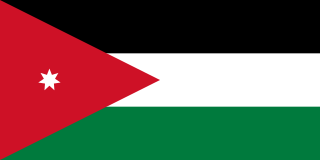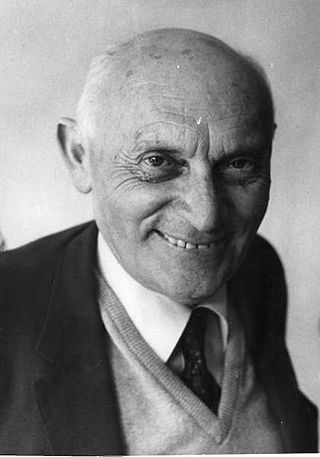Related Research Articles

Zionism is a nationalist movement that emerged in the 19th century to espouse support for the establishment of a homeland for the Jewish people in Palestine, a region roughly corresponding to the Land of Israel in Jewish tradition. Following the establishment of Israel, Zionism became an ideology that supports "the development and protection of the State of Israel".

The Greek Orthodox Patriarchate of Jerusalem, also known as the Greek Orthodox Church of Jerusalem, is an autocephalous church within the wider communion of Eastern Orthodox Christianity. Established in the mid-fifth century as one of the oldest patriarchates in Christendom, it is headquartered in the Church of the Holy Sepulchre in Jerusalem and led by the Patriarch of Jerusalem, currently Theophilos III. The Patriarchate's ecclesiastical jurisdiction includes roughly 200,000 to 500,000 Orthodox Christians across the Holy Land in Palestine, Jordan and Israel.

The Jordanian annexation of the West Bank formally occurred on 24 April 1950, after the 1948 Arab–Israeli War, during which Transjordan occupied territory previously part of Mandatory Palestine and, excluding Jerusalem, earmarked by the UN General Assembly Resolution 181 of 29 November 1947 for an independent Arab state to be established there alongside a Jewish state mainly to its west. The annexation tripled the population of Transjordan, from 400,000 to 1,300,000.

Abu Dis or Abu Deis is a Palestinian village in the West Bank, in the Jerusalem Governorate of the State of Palestine, bordering Jerusalem. Since the 1995 Oslo II Accord, Abu Dis land has been mostly part of "Area B", under Israeli military control and Palestinian civic control. According to the Palestinian Central Bureau of Statistics (PCBS) census, Abu Dis had a population of 12,604 in 2016.

A zoo is a facility in which animals are kept within enclosures for public exhibition and often bred for conservation purposes.

Professor Aharon Shulov was an Israeli entomologist and the founder of the Jerusalem Biblical Zoo.

Oren Yiftachel is an Israeli professor of political and legal geography, urban studies and urban planning at Ben-Gurion University of the Negev, in Beersheba. He holds the Lynn and Lloyd Hurst Family Chair in Urban Studies.

al-Mughayyir is a Palestinian village in the Ramallah and al-Bireh Governorate, located 27 kilometers Northeast of Ramallah and 34 kilometers Southeast of Nablus, in the northern West Bank. According to the Palestinian Central Bureau of Statistics (PCBS), the village had a population of 2,368 inhabitants in 2007.
Nur ad-Din Masalha commonly known in English as Nur Masalha is a Palestinian writer, historian, and academic.

The Israel Law Review is the oldest Israeli law journal published in English. In Great American Lawyers, an Encyclopaedia, it is referred to as being among "the most prestigious of scholarly journals". The journal focuses on Israeli law and on issues relevant to Israeli society.
Harry Sacher was a British businessman, journalist, and Zionist leader. He was appointed director of Marks & Spencer in 1932.

Jalud is a Palestinian village in the Nablus Governorate in the northern West Bank. It is approximately 30 kilometers (19 mi) south of Nablus and is situated just east of Qaryut, south of Qusra and northeast of Shilo, an Israeli settlement. Its land area consists of 16,517 dunams, 98 of which constitutes its built-up area. Jalud is encircled by four illegal outposts: Esh Kodesh, Adi Ad, Ahiya and Shvut Rachel. Jalud residents were blocked by both IDF forces and settlers from tending most of their farms from 2001 to 2007. In 2007 permission was given to farm their groves, twice a year for a few days, on condition that prior coordinating arrangements are made with the IDF.

Mandatory Palestine was a geopolitical entity established between 1920 and 1948 in the region of Palestine under the terms of the League of Nations Mandate for Palestine.

Pattycake, also known as Patty Cake was a female western lowland gorilla born to Lulu and Kongo at the Central Park Zoo in New York City. She was the first baby gorilla successfully born in captivity in New York. Months after her much publicized birth, Pattycake's arm was broken when it got stuck in her cage as her mother grabbed her away from her father. The incident was sensationally anthropomorphized in the media as a domestic dispute between Lulu and Kongo, but in reality experts thought it was a simple accident.

Mark Braverman is an American psychologist and activist for Palestinian rights. He is the executive director of Kairos USA, a pro-Palestinian group for American Christians.

Olive trees are a major agricultural crop in the Palestinian territories, where they are mostly grown for olive oil production. It has been estimated that olive production accounted for 57% of cultivated land in the Palestinian territories with 7.8 million fruit-bearing olive trees in 2011. In 2014, an estimated 108,000 tonnes of olives were pressed producing 24,700 tonnes of olive oil – which contributed US $10.9 million in added value to the crop. Around 100,000 households rely on olives for their primary income.
Timmy was a western lowland gorilla and a 25-year-long resident of the Cleveland Metroparks Zoo. He was primarily housed indoors at the Zoo's Primate, Cat & Aquatics building. The even-tempered silverback gorilla was euthanized at the Louisville Zoo after suffering from chronic cardiovascular disease and osteoarthritis in 2011.

The Israeli occupation of the West Bank began on 7 June 1967, when Israeli forces captured and occupied the territory, then ruled by Jordan, during the Six-Day War, and continues to the present day. The status of the West Bank as a militarily occupied territory has been affirmed by the International Court of Justice and, with the exception of East Jerusalem, by the Israeli Supreme Court. The official view of the Israeli government is that the laws of belligerent occupation do not apply to the territories, which it claims are "disputed", and it administers the West Bank, excepting East Jerusalem, under the Israeli Civil Administration, a branch of the Israeli Ministry of Defense. Considered to be a classic example of an "intractable" conflict, the length of Israel's occupation was already regarded as exceptional after two decades, and is now the longest in modern history. Israel has cited several reasons for retaining the West Bank within its ambit: a claim based on the notion of historic rights to this as a homeland as claimed in the Balfour Declaration of 1917; security grounds, both internal and external; and the deep symbolic value for Jews of the area occupied.

The Israeli permit regime in the West Bank is the legal regime that requires Palestinians to obtain a number of separate permits from the Israeli military authorities governing Palestinians in the Israeli-occupied West Bank for a wide range of activities. The first military order requiring permits for the Palestinians was issued before the end of the 1967 Six-Day War. The two uprisings of 1987 and 2001 were met by increased security measures, differentiation of IDs into green and red, policies of village closures, curfews and more stringent restrictions on Palestinian movement, with the general exit permit of 1972 replaced by individual permits. The stated Israeli justification for this new permit regime regarding movements was to contain the expansion of the uprisings and protect both the IDF and Israeli civilians from military confrontations with armed Palestinians. The regime has since expanded to 101 different types of permits covering nearly every aspect of Palestinian life, governing movements in Israel, in Israeli settlements, transit between Gaza and the West Bank, Jerusalem, the seam zone and travel abroad via international borders. The Israeli High Court has rejected petitions against the permit regime, allowing that it severely impinges on the rights of Palestinian residents but that the harm was proportionate.
Land expropriation in the West Bank refers to the practices employed by the State of Israel to take over Palestinian land in the occupied West Bank. From 1969 to 2019 Israel had issued over 1,150 military seizure orders alone to that purpose.
References
- 1 2 3 "Irus Braverman". Acsu.buffalo.edu. Retrieved 2013-05-15.
- ↑ "Former Visiting fellows". Law.harvard.edu. Retrieved 2013-05-15.
- ↑ "THE Voice of the Independent Publishing Industry". Independent Publisher. Retrieved 2013-05-15.
- ↑ Hernandez, Christina (2012-12-17). "Q&A: Irus Braverman, author of Zooland: The Institution of Captivity". SmartPlanet. Archived from the original on 2013-05-10. Retrieved 2013-05-15.
- ↑ Plait, Phil (2013-05-03). "Irus Braverman's Zooland: Study of zoos and conversation, reviewed. - Slate Magazine". Slate.com. Retrieved 2013-05-15.
- ↑ Irus Braverman (28 November 2012). Zooland: The Institution of Captivity - Irus Braverman. Sup.org. ISBN 978-0-8047-8357-6 . Retrieved 2022-02-11.
- ↑ Cave, Stephen (2012-09-28). "Animal spirits". FT.com. Retrieved 2013-05-15.
- ↑ Kolbert, Elizabeth (2018-10-08). "How to Write About a Vanishing World". New Yorker. Retrieved 2022-02-11.
- ↑ McCalman, Iain (2019-04-03). "Shouting About Reefs". The Times Literary Supplement. Retrieved 2022-02-11.
- ↑ "SSRN Author Page for Braverman, Irus". SSRN. Retrieved 2013-05-15.
- ↑ Irus Braverman (25 November 2008). "'The Tree is the Enemy Soldier': A Sociolegal Making of War Landscapes in the Occupied West Bank". SSRN 1307044.
{{cite web}}: Missing or empty|url=(help) - ↑ Irus Braverman (2011). "Civilized Borders: A Study of Israel's New Crossing Administration". SSRN 1956721.
{{cite web}}: Missing or empty|url=(help) - ↑ Irus Braverman (2010-02-07). "Uprooting Identities: The Regulation of Olive Trees in the Occupied West Bank". SSRN 1548592.
{{cite web}}: Missing or empty|url=(help) - ↑ Irus Braverman. "Looking at Zoos". SSRN 1956705.
{{cite web}}: Missing or empty|url=(help) - ↑ Irus Braverman. "Passing the Sniff Test: Police Dogs as Surveillance Technology". SSRN 2142530.
{{cite web}}: Missing or empty|url=(help) - ↑ Irus Braverman (5 April 2013). "Animal Frontiers: A Tale of Three Zoos in Israel/Palestine". SSRN 2245796.
{{cite web}}: Missing or empty|url=(help) - ↑ Irus Braverman (2021-05-28), Wild Legalities: Animals and Settler Colonialism in Palestine/Israel
- ↑ Irus Braverman (2021-03-12), Environmental justice, settler colonialism, and more-than-humans in the occupied West Bank: An introduction
- ↑ Irus Braverman; Nicholas Blomley; David Delaney; Alexander Kedar. "The Expanding Spaces of Law: A Timely Legal Geography". SSRN 2235164.
{{cite web}}: Missing or empty|url=(help) - ↑ Irus Braverman (2013-05-11). "Zooland: The Institution of Captivity". SSRN 2263361.
{{cite web}}: Missing or empty|url=(help) - ↑ "Planted Flags: Trees, Land, and Law in Israel/Palestine (Cambridge Studies in Law and Society): Irus Braverman: Books". Amazon. 2009-07-31. Retrieved 2013-05-15.